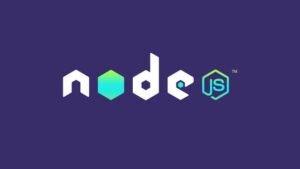Nodejs platform actually works in a stunning way of building extensive web applications. Nodejs is a popular platform for building backend systems like network applications with great scaling features. It is a JavaScript run-time environment, which means it runs the JavaScript codes.
JavaScript is a long-standing programming language in web pages and run by any web browsers. As of now, JavaScript can also run without a browser which made possible using the Nodejs platform which uses Google Chrome’s V8 JavaScript engine.
Wondering how a scripting language(JavaScript) can be used for developing web applications. As we all know that a bundle of compiled codes is much more efficient than the interpreted scripts.
In addition to this, the Nodejs platform is a single-threaded language that greatly broadened its scope in web application development and becomes a much feasible browser scripting language.
Few of the real developmental scenarios of Nodejs are:
- Websites – React.js, Angular, jQuery, and many more.
- Backend Systems – Nodejs.
- Persistence (Database) – MongoDB.
- Mobile, and Desktop applications.
How does the Nodejs platform work?

The Nodejs platform works based on four different concepts in its architecture:
- Non-blocking operations.
- Callback mechanism.
- V8 JavaScript engine.
- Event loop.
Non-blocking operations
Nodejs is all about non-blocking and perfect asynchronous architecture. Eventually, it means any operations that really take a long time to finish like file access, network communication, and database operations, are requested and put on hold until the results are ready and return through a callback function.
In JavaScript, another approach is used with callbacks. When an operation gets complete, a non-blocking call in JavaScript provides a callback function to indicate task completion.
In simple,
- The main thread won’t block any input/output operations.
- The server will keep working on upcoming requests.
- It works with asynchronous code every single time.
Callback mechanism
A callback is an asynchronous equivalent for a function mostly. An asynchronous function has the functionality to call all the events when they complete the execution. The asynchronous function does not wait for any task to complete, it continues its execution process.
Callback function is a function that is called automatically after the completion of the successful execution of a process.
In simple, a callback function is generally called at the end of any given task. Nodejs makes heavy use of callbacks than others. All the Application Programming Interface(APIs) of the Nodejs platform are in such a way that all they support callback functions.
V8 JavaScript engine
Nodejs platform uses the ultra-fast Google Chrome’s V8 execution engine. During its release, the V8 engine grabs the attention of developers around the world. Because it’s an open-source tool by Google which analyses and runs JavaScript code very quickly.
Until the inception of Chrome’s V8, most browsers fail to read the JavaScript efficiently. Because it reads and interprets the code bit by bit. Here in Nodejs, it uses Google Chrome’s V8 engine which completely works differently from others. It quickly transforms the way how JavaScript code turns into machine language.
Nodejs platform optimizes these processes through some sophisticated processes like code in-lining and a copy elision, among others.
Event loop
One of the main reasons for such lighting fast speed of Nodejs platform is its Event loop model. And it reaches such speed as it uses events heavily. It is pretty fast when compared with other similar technologies. As Nodejs starts, it simply initiates its variables and declares functions. Then which relates to processing then simply waits for the event to occur continuously.
In an event-driven application, If any events are been detected then the main loop that waits for events, and triggers a respective callback function.
Although events look similar to callbacks, the key difference between that callback function is called. When an asynchronous function returns its result on the observer pattern. The functions that listen to events act as Observers in the event loop concept. Thus, Nodejs has multiple in-built events that are available through events module and EventEmitter class which is to bind events and event-listeners.
CONCLUSION
Hopefully, this blog helps you to pick the best technology(i.e. Nodejs framework) for your project. If you want to build a scalable Nodejs application, Contact us without any hesitation.

Leave a Reply